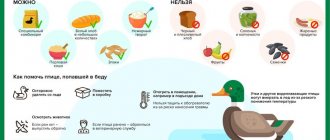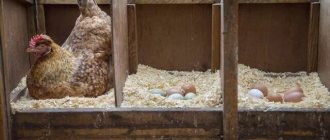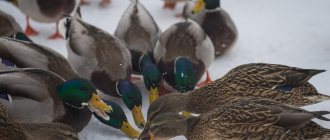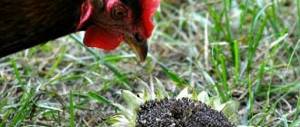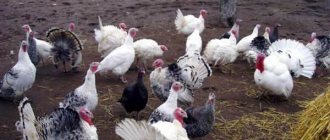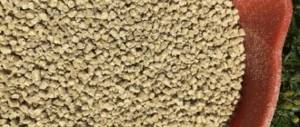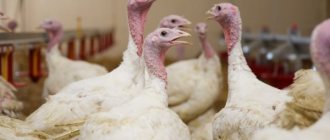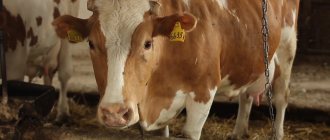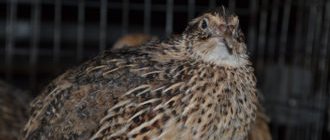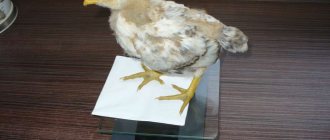Classification
Compound feed is divided into three large categories:
- starting;
- average;
- finishing.
Starter is a compound feed that must be given to birds from the first day to the thirtieth, despite the presence of a period of 0-14 days on the bag. This food is given exclusively dry and is usually in the form of granules or cereals.
The grain base for the described food is wheat and corn. This composition also includes soybean and sunflower cake, which act as an additional source of fiber.
In addition, there are residues from the creation of vegetable oil. This food contains the most balanced amount of fermented substances, antioxidants, and minerals in the context of the age of the birds.
Typically it contains about 20% protein. For two weeks of life, the consumption rate of such feed per bird should be 600 g.
The average type of feed will be necessary for older individuals. It has almost the same composition as the starter, except that it contains slightly less protein and more vitamins, as well as carbohydrates.
Manufacturers recommend using a similar feed for turkey poults that have reached fifteen days of age and up to 32 days of life, although the breeders themselves note that this solution will be better for turkeys 30-45 days of age. In two weeks, one bird should eat about 2 kg of feed.
The final version of the feed is the main one. It is suitable for turkeys that are in the last stage of fattening. Usually we are talking about individuals from the 60th day of life until the moment of slaughter. It all depends on what breed this or that individual belongs to.
This feed has the same composition with a slight difference: there are more carbohydrates and fats than in the starter or average type of feed. In this case, there is no clear understanding of what feed consumption should be. It is usually fed in as much quantity as the bird can eat.
There may be other categories of food, for example, for laying turkeys. This food contains all the ingredients mentioned above. But there the ratio will be such that the number of eggs in turkeys is maximum.
Conducted studies indicate that when using this category of feed, one bird can lay up to 2 hundred eggs during the entire laying period. There will be an identical division by subspecies with the only difference being that after the middle stage the birds are fed with phase feeds.
Such options are intended for adults who have entered the egg-bearing period, that is, on the 140th day after birth. One turkey should receive about a quarter of a kilogram of feed per feeding, distributed three times a day.
It should also be understood that a fairly small number of breeders are willing to spend serious financial resources on various types of feed. In this situation, you can find an alternative - making them yourself. The main thing you should know clearly is the proportions of the ingredients.
Which ready-made food should I choose?
It should be said that the products in question are presented on the market from various brands and manufacturers.
One of the most famous manufacturers is Purina.
It has been producing food for various categories of pets for about 200 years.
Over this period, the company's products have become significantly more advanced and meet the interests and requirements of consumers even better.
To formulate the diet of birds, a whole line of products has been developed that takes into account the needs of the body.
Below is a rating of the most popular feeds:
- "Starter-1" is a starter-type feed used for turkey poults up to 4 weeks. Usually made in the form of cereals or granules and served dry. The product described contains various ingredients. We are talking about crushed grains of wheat and corn, as well as products that are obtained by processing sunflowers and plows, various additives and vitamins.
- "Starter-2" is used for fattening turkey poults at 4-9 weeks of life. The composition here is the same as in the analogue described above, except that there are more ingredients here - complex minerals and calcium have been added.
- “Starter-3” (or “Grower”) is fed to broilers from 10 to 15 weeks of life. There is more grain, less protein, and the amount of vitamins and carbohydrates is increased compared to the previous two types of feed. This allows the bird to become mature faster.
- “Finisher” is a compound feed that is used from the 16th week of a bird’s life. There are few minerals, but enough fiber, carbohydrates and fats.
A fairly well-known domestic brand is called “Start”. This brand produces high-quality feed, which is also intended for various categories of turkeys depending on the period of their life.
All types of feed from this manufacturer have the same composition, and the only difference will be the presence or absence of special additives.
This feed includes several varieties.
- PC-11. This is a mixture in the form of small granules, it belongs to the complete category. It is given to turkey poults at 5-13 weeks of life. Ingredients used to create this food include corn, wheat, sunflower and soybean meal, fish meal, feed yeast, sunflower oil, limestone flour and salt.
- PC-12. This type of feed is relevant for turkey poults at 14-17 weeks of life. When creating it, the same components are used.
- PC-13 is relevant for turkey poults at 15-30 weeks of life.
- PK-14 is relevant for breeding young animals. It contains ingredients such as enzyme, premix, feed yeast, barley, limestone, fish meal.
Also quite an interesting solution for farmers who prefer ready-made feed will be mixtures such as:
- Best Mix;
- "Spasskie mixed feed";
- "Vogel".
A rather interesting solution would be compound feed, which is produced under the “Power of Nature” brand.
Here, in addition to the usual products that are in any compound feed, there is a whole complex of vitamins and minerals, including vitamins B, A, D3, as well as useful substances and microelements such as selenium, copper, zinc, iron and various antioxidants.
Another quite popular compound feed among farmers is “TopKorm”. It is intended for young birds. After eating it, you can switch the turkey poults to a product called “Growth,” which is produced under the same brand.
It is presented in the form of cereals, which makes it possible to eat it for chickens up to 8 weeks of age. In addition to the required set of vitamins and ingredients, it contains nicotinic and folic acid, as well as magnesium.
On the market you can find products that are produced by one or another bakery plant. Bakery waste becomes the basis for the production of animal feed. The most famous on the domestic market is “Ramensky”, which is considered almost universal and is suitable for almost any animal.
As you can see, any farmer will have plenty to choose from so that his turkeys grow quickly and gain weight.
Compound feed for large turkeys
Large turkeys grow quickly on mixed feed. At the same time, they rarely get sick, have tender meat and a beautiful color of the meat. But the main problem with such feeding is the price. Good feed is expensive, especially since turkeys need to purchase special feed designed for them. In the store, food for large turkeys is divided into types according to the weight and age of the bird. For example:
- PK-11 (“Starter”) – for newborns;
- PK-11-2 (“Starter”) – from 5 to 13 weeks;
- PC-12-1 – for weeks 14-17;
- PC-13-1 (sometimes called “Grower”) – 15-30 weeks;
- PK-14 – breeding young animals.
- Compound feed at the final stage of fattening is called “Finisher”. It is given to birds from 2 months until slaughter.
Indians are fed grain to gain weight quickly
As a rule, feed is purchased so that turkeys reach their maximum size in just one summer, while ideal conditions for pasture feeding are created outside. After about 4-5 months of feeding on compound feed, the turkey reaches normal weight for slaughter. But during this time he eats a lot of expensive food. So, for one female, 16 kg of feed is purchased for 4 months, and for a male, twice as much!
If after 4 months the turkey has not gained the required weight, it is fed for 2-3 weeks with nutritious flour food, consisting of:
- 25% wheat bran;
- 25% barley flour;
- 20% corn flour;
- 15% oat flour;
- 3% yeast;
- 1% salt.
What to look for when choosing feed?
To choose exactly what you need, focus on age. Having chosen a food, you also need to find out how many calories it contains in order to calculate the daily intake.
If you plan to slaughter poultry for meat in the future, you should choose food that will promote rapid weight gain. This turkey feed has more vitamins and proteins. The calorie content of the feed should correspond to the age of the bird.
The older the bird, the more calories turkey feed should contain. The amount of daily calorie intake does not depend on the composition of turkey feed. This number is stable and depends only on the age of the bird.
Although the price of different types of food may vary, you should not choose the cheapest one. Naturally, feed for turkeys should not be expired. It should be noted that in addition to vitamins, proteins, and mineral salts, fiber should be added to the feeding of adult birds.
Young birds, on the contrary, do not need fiber at all and are even harmful. Turkey feed should not contain animal products.
Such feed for turkeys negatively affects the liver, and with constant use can cause diseases, so they are not given at home.
Feeding should be done with easily digestible foods that will promote growth and weight gain.
If compound feed requires that it be fed wet, then it must be prepared just before distribution, otherwise it may ferment or sour.
Feed composition
Recipes for combined dry food are prepared by specialists. They take into account the amount of exchange energy. The indicator was calculated by scientists empirically. Turkeys spend a certain amount of energy on growth and development. The calculations took into account the age of the bird, the amount of energy that the individual expends to maintain vital processes occurring in the body, to increase productivity: growth of muscle mass, formation of eggs in females.
The body needs to replenish the energy it expended and receive additional calories for full development. Birds receive this energy through food. The energy value of each product included in the diet of turkeys was calculated. The volume of crude protein, fat, starch, sugar and other ingredients was taken into account.
Feed fat should not be replaced with pork fat. Pork is a component of the feed product. It also contains beef fat and vegetable oils. Certain formulas and coefficients were derived empirically. They are different for each species of animal and bird. For turkeys, the energy value of recipes is calculated using the following formula:
ME (metabolizable energy) = 15.51*amount of crude protein in the product + 34.31*crude fat + 16.69*amount of starch + 13.01*crude sugar.
It has been calculated that turkeys of different ages require a certain amount of energy. The indicator is measured in kJ per 100 g:
- 1 month – 1214; this amounts to 290 kcal;
- 2-4 months – 1255 kJ or 300 kcal;
- 5-8 months – 1130; 270 kcal;
- adult individuals require 1172 kJ or 280 kcal per 100 g.
To satisfy the needs of the bird's body, the composition of feed for turkeys was calculated. It contains crude protein, fiber, minerals and amino acids. The feed for chicks 1 month of age contains the following proportions:
- 28% – crude protein;
- 4% – fiber;
- 1.7% – calcium;
- 1.56% – phosphorus;
- 0.4% – sodium;
- 0.14% – chlorine;
- 500 mg – magnesium;
- 1.5% – linoleic acid;
- 1.5% – lysine;
- 0.6% – methionine;
- 1% – methionine and cystine.
Composition of feed for turkeys with your own hands
Manganese, iodine, copper, iron, zinc, and selenium are added to the mixture for turkeys. The feed should combine the proportions of B vitamins, carotene, vitamins K, E, D, and C. Despite the fact that young animals at 2-4 months require the same amount of metabolic energy, the proportions of nutrients within the diet are different. At 2-3 months, the chicks maintain the following balance:
More on the topic: What to do if turkeys fight among themselves?
| № | Helpful information |
| 1 | 22% – crude protein; by 4 months the amount is reduced to 20% |
| 2 | 5% – fiber; Volume increases by 17 weeks to 6% |
| 3 | 1.7% – calcium |
| 4 | 1.25% – phosphorus |
| 5 | 0.3% – sodium |
| 6 | 1.5% – linoleic acid; quantity in 4 months 1.8% |
| 7 | 1.19% – lysine; for young animals 17 weeks 1.07 |
| 8 | 0.47% – methionine; by 4 months 0.43 |
| 9 | 0.79% – methionine and cystine; decreases with age to 0.71% |
A decrease in the body's need for nutrients is associated with slower growth of turkey poults. Adults require less crude protein, fiber and fat than one-month-old chicks. At 5-8 months, individuals need to consume feed containing the following ratio of ingredients:
- 14% protein; for adult turkeys 16%;
- 7% fiber; for adult birds 6%;
- 1.7% calcium, 0.11% phosphorus, 0.3% sodium; turkeys require more calcium, up to 2.8%;
- 2% linoleic acid; for yearlings 1.5%;
- 0.75% lysine for young animals; 0.7% for turkeys;
- 0.3% methionine; 0.32% for individuals after puberty;
- 0.5% methionine and cystine; 0.52% of the substance is required by adult birds.
The need for vitamins and minerals does not change with age. Chicks and turkeys are given mixed feed containing 5000 units. carotene, 1100 vitamin D, 10 units. vitamin "E", 0.5 units. vitamin K. To prepare dry mixtures at home, premixes are purchased. The packaging indicates the composition and amount of vitamins and microelements.
How to make a composition with your own hands?
But not all farmers prefer to use compound feeds that can be found on the market today. The reasons for this decision may vary.
For example, it is not possible to constantly purchase large quantities of compound feed, or they doubt the naturalness of such mixtures. In any case, if you wish, you can make such a composition yourself.
It is worth noting that food prepared by yourself is practically no different in composition from that produced in an industrial environment, since it will contain the same components.
However, you can add unusual ingredients there:
- salt;
- boiled egg;
- dry food scraps from the table;
- cottage cheese;
- crushed shell.
It should be noted that cooking recipes differ somewhat depending on the age of the turkeys.
For example, for turkey poults, whose age is up to 2 months, the recipe for preparing feed will be as follows:
- soybean cake – 32%;
- corn bran - one third of the mixture;
- extruded soybean – 10%;
- sunflower cake – 9%;
- wheat bran – 7%;
- fishmeal – 5.5%;
- chalk – 3.5%;
- calcium phosphate – 1.5%.
If we talk about a recipe for turkey poults up to 4 months, the content of various elements will be slightly different:
- corn bran – 40%;
- wheat - about 18%;
- sunflower cake – 10.5%;
- soy – 9%;
- fish, meat and bone and grass meal and feed yeast - 5% each;
- chalk – 1.5%.
If we talk about turkey poults aged 4-6 months, then the recipe for them will be as follows:
- corn and barley bran – 35% each;
- wheat – 10%;
- herbal flour – 7%;
- fish – 4%;
- feed yeast – 3.5%;
- sunflower cake – 3%;
- chalk – 1.5%.
It should be noted that preparing feed yourself is a fairly simple process. In a certain container, you need to carefully and thoroughly mix the ingredients for turkeys of a certain age.
For mixing, it is better to use a basin or trough, and the substances must be added in the specified percentage and mixed.
Now you can use the mixture to feed turkey poults. It won't hurt to let it brew a little.
Consumption and feeding rates
It should be said that during the egg-laying period there should be enough food in the feeder so that the turkey can eat as much as he wants.
However, when feeding, too much food consumed can cause obesity. For this reason, turkeys need to be fed carefully.
If we talk about the norms of feeding and consumption of adult birds, then during the day females usually eat 300-400 g of feed, and males - up to 500 g. The same figure will be for heavy crosses.
Feeding adults should be carried out three times a day with permanent monitoring of the bird's live weight gain and its appearance.
If signs of obesity suddenly appear, then the diet should be changed by reducing the mass fraction of grass flour and adding various categories of bran, for example, oats and barley.
As for turkey poults, for good feeding they should be accustomed to constant food intake.
Low-weight turkey poults need to be fed 8 times a day at regular intervals. When they are a month old, they can switch to a six-meal system.
The weekly volume of feed supplied in the first 60 days of life will be as follows:
- first – 10 or 12 g;
- second – 15 g;
- third – 22 g;
- fourth – 35 g;
- fifth – 50 g;
- sixth – 75 g;
- seventh – 110 g;
- eighth – 160 g.
When the turkeys are 25-30 weeks old, the amount of food should be gradually increased to 280-300 g.
Prohibited Products
To properly feed turkeys, you need to know what food you should absolutely not give them. Most of the bans concern food waste from the human table. The bird is not given:
- salty and spicy foods (herring, pickled and pickled cucumbers, marinades and hot sauces);
- snacks (chips, salted and sweet nuts, crackers with spices);
- confectionery products (chocolate, candies).
Do not feed green and sprouted potatoes to the bird. This product contains poison - corned beef, which causes poisoning and death of the bird.
When letting turkeys out for a walk or preparing greens for them, you should pay attention to poisonous herbs, preventing them from getting into the feeder. This group of plants includes buttercup, henbane, datura, ash, hemlock, St. John's wort
Compound feed for young animals
Compound feed for young animals has its own characteristics depending on how many weeks the young animals are. From the very age when turkey poults are born until the end of fattening, all instructions for selecting feed must be strictly followed.
This applies to both the products that go into food and the entire eating regimen. Newly hatched turkey poults are very weak and unviable, and their health and life depend on proper nutrition during this period.
Their beaks are not yet strong and their eyesight is poorly developed. Given this, feeding must be done under strict control. They definitely need to eat. Don’t forget that newborns need to not only be fed, but also given water to drink.
It is best to give them water with sugar or glucose. It is also advisable to add vitamin C to this solution. Dosage per 1 liter of water, sugar: 2 tbsp. spoons. Vitamin C is added to this mixture in powder form at the rate of 1 packet per liter.
12-16 hours after hatching, the fry should begin to be fed. Boiled eggs are used for this. They need to be finely chopped and passed through a sieve.
After this, you should put wheat or corn flour into the eggs. The birds are fed this mixture for a week. After which the egg is no longer needed.
In order for turkey poults to actively absorb food, it is necessary to imitate the actions of their mother. After distributing the food, you need to knock on the board with your finger, because the turkey calls its children to food by knocking with its beak.
Introduction of new food for day-old birds
As soon as the chicks are a day old, the owner must enrich their diet.
There is no need to introduce many new foods at one time, since the turkeys' stomachs must adapt to the unusual food and they must eat the new food. A new product should be introduced at the rate of 1 part new to 4 parts familiar.
Next, it will be written in the instructions what to add first and what then to one-day-old chicks on the second day of their life. All products are given in very small form. To achieve the desired consistency, it is best to grind them through a sieve.
The following foods can be given
- Cottage cheese with low fat content.
- Green onion with feathers.
- Carrot.
You should not be negligent in the general care of the chicks. Like food, all living things need water. It must be uncontaminated and fresh. To do this, you need to pour out the settled water every 3-4 hours and add fresh water.
It should be remembered that the chicks are still very tender, so the water should not be too cold or hot.
The optimal temperature is room temperature. It is also worth purchasing comfortable feeders and drinkers for chicks.
If turkey poults are two days old, they should be given homemade feed for food.
- Dandelion leaves;
- Millet;
- Nettle;
- Alfalfa in the form of green mass;
- Wheat dirt, highly crushed;
- Ready-made feed mixture.
The mixture that is given to the chicks as food after the first day should not be dry. To make it moist, it is mixed with meat broth, yogurt or whey. The mixture should not look like porridge or a solution; it should crumble easily. Therefore, the liquid should be poured in small portions, stirring thoroughly. After the second day, the turkeys are given barley or oatmeal. They can be given either separately or as additives to the main feed. The second method is preferable if turkey poults refuse to eat. The bird must be fed at intervals of three hours. A longer period of time between meals is unacceptable. Each time, only fresh food is given, and the remains of old food are removed. Also, at each feeding, you need to add new foods to the diet according to the scheme indicated above.
Is it possible to feed feed intended for other animals?
Many farmers often try to replace turkey feed with other analogues.
For example, they use pork and chicken feed. The use of the pork version is very dangerous, because its use in this case can cause liver disease, and processing pork feed with a coarser consistency will quickly wear it out.
You can also give turkeys calf feed, which is much more tender, but only for a short period of time.
If you really want to use analogues, then you can use chicken feed, or rather, a mixture for broilers. But it needs to be modified a little. More precisely, you need to add protein components to it, which will accelerate the growth of muscles and bones.
This can be done using one of three components:
- cottage cheese - 3 g per bird;
- boiled egg - 3 g per bird;
- bone meal - 1 kg per 10 kg of feed.
The older the turkey poults, the more additives need to be used. You also need to add various greens to your diet: alfalfa, onions, dandelion, nettles.
Thus, raising turkeys is quite a profitable business. But in the matter of feeding, there are a number of important nuances that should be taken into account when keeping them.
In order for birds to grow and develop well, they need high-quality, complete and balanced nutrition. As you can see, there are more than enough such solutions on the market.
If you wish, you can make compound feed yourself, and it will be in no way inferior to its industrial counterpart, which costs more. Such feed must be prepared correctly, which not every farmer can do.
What should you not give to turkeys?
Also check out these articles
- Black carrots
- Geranium flower
- Quail drinking bowls
- Feed corn (feed)
There are a number of foods and feed mixtures that cannot be fed to turkeys. They can lead to obesity, growth problems, increased disease and even death of the entire population.
Plants that are contraindicated for feeding turkeys
- Compound feed for cattle contains urea and some other components that are considered dangerous for all types of birds, including turkeys, so when purchasing compound feed you need to clarify for whom it is designed and check the composition just in case.
- Compound feed with growth stimulants and hormones can negatively affect the condition of the poultry that consumes it and spoil the taste and quality of the meat obtained from it.
- Spoiled, sour feed and mash for turkeys are strictly prohibited. They lead to digestive problems and even death.
- Fiber in large quantities can be harmful for turkey poults. So it is minimized in the diet.

